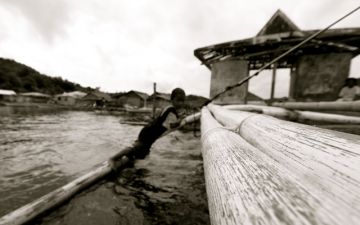The Philippines marks 25 years since the People Power Revolution overthrew decades of dictatorial rule. The administration of Ferdinand Marcos was unseated and democracy was restored after four days of a mass uprising gripped the world’s attention.
But a quarter of century after the demise of Marcos, the Philippines still struggles with rampant government corruption and poverty. A major contributing factor to this state of affairs is an unregulated economy that is highly dependent on the extraction and export of natural resources.
This project seeks to document how the nation’s wealth in resources spurs armed conflict and an increasingly inequitable distribution of income. Investors, whether in domestic or foreign transactions, are embroiled in a global market’s infinite demand for finite resources of the country's 7,100 islands.
Whether in boatloads of live reef fish or the illegal logging of hardwoods, the impact begins in remote locales. The role of resource extractions on the most marginalized communities in the Philippines often goes unseen and unheard in the media and public affairs. There is much hope in the recently elected administration of President Benigno Aquino, which maintains a political platform for transparency and sustainable development.


